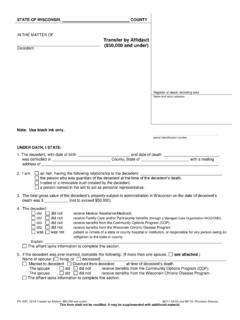Transcription of Multi-State Non- Resident Withholding
1 Multi-State Non- Resident Withholding Myrtle Beach, November, 2016. Notice The following information is not intended to be written advice concerning one or more federal tax matters subject to the requirements of section (a)(2) of Treasury Department Circular 230. The information contained herein is of a general nature and based on authorities that are subject to change. Applicability of the information to specific situations should be determined through consultation with your tax adviser. 2016 KPMG LLP, a Delaware limited liability partnership and the member firm of the KPMG network of independent member firms affiliated with KPMG International Cooperative ( KPMG International ), a Swiss entity. All rights reserved. NDPPS 600218. 2. Welcome With you today Fred MananBasehore, Senior Shah, Senior Manager Manager KPMG Atlanta Raleigh Employment Tax Services (919). (404) 664-7124. 739-5247. 2016 KPMG LLP, a Delaware limited liability partnership and the member firm of the KPMG network of independent member firms affiliated with KPMG International Cooperative ( KPMG International ), a Swiss entity.
2 All rights reserved. NDPPS 600218. 4. Multistate Withholding Payroll issues with multistate nonresident Withholding Payroll tax compliance is one of the primary concerns expressed when addressing multistate Withholding requirements on regular wages, supplemental wages, and equity-based compensation. - Should we report? - Should we withhold? - Where should we report? - How much to report? - How much to withhold? - When to report? - Timeliness of tax remittance to authorities - Who is legally liable employer, employee, or both? 2016 KPMG LLP, a Delaware limited liability partnership and the member firm of the KPMG network of independent member firms affiliated with KPMG International Cooperative ( KPMG International ), a Swiss entity. All rights reserved. NDPPS 600218. 6. State unemployment taxes The basics State unemployment insurance (SUI) taxes assessed to all for-profit employers. Tax structure used to finance the unemployment claims system.
3 Not-for-profit employers generally reimburse for SUI claims filed. Taxes are used to replenish employer accounts after benefits are paid to separating employees. Tax payments are generally based on three factors: - Employer's taxable wages (vary by state). - Health of the state's UI tax reserves, and - Employer's assigned SUI tax rate (varies by employer, dependent upon benefits paid, and other state factors). 2016 KPMG LLP, a Delaware limited liability partnership and the member firm of the KPMG network of independent member firms affiliated with KPMG International Cooperative ( KPMG International ), a Swiss entity. All rights reserved. NDPPS 600218. 7. State unemployment Wage sourcing rules General rules - SUI wages should generally be reported in the state in which the employee primarily perform services. - SUI wages are generally sourced to one state per calendar year unless there is a change in an employee's primary work location.
4 Sourcing rules (four prong test). 1. Localization of services State in which a majority of services are performed, provided that services provided outside of that state are incidental. 2. Base of operations If services are regularly performed in more than one state, wages should be sourced to the state where the employee maintains a base of operations if some services are performed in that state. 3. Direction and control If an employee lacks a true base of operations, wages should be sourced to the state from which the employee receives direction and control if some services are performed in that state. 4. Residence If none of the other factors apply, source SUI wages to the employee's state of residence. 2016 KPMG LLP, a Delaware limited liability partnership and the member firm of the KPMG network of independent member firms affiliated with KPMG International Cooperative ( KPMG International ), a Swiss entity. All rights reserved.
5 NDPPS 600218. 8. State income tax Withholding The basics Requirements and obligations of employer are well defined in most cases. The employer is ultimately responsible for proper Withholding and reporting of their employee's state-sourced income. Sourcing rules (generally). - Income should be sourced to state or states where employee performs services. - Non- Resident employees traveling to different states should have state income tax (SIT) withheld in those states . - Equity compensation is typically based on a look back period taking into account where the money was earned at a given point ( , upon vesting) rather than where it is paid out. 2016 KPMG LLP, a Delaware limited liability partnership and the member firm of the KPMG network of independent member firms affiliated with KPMG International Cooperative ( KPMG International ), a Swiss entity. All rights reserved. NDPPS 600218. 9. Non- Resident state income tax Withholding In general, employers are required to withhold SIT on non-residents of a state if services are or were performed by the employee in that state.
6 Exceptions/limitations: - De minimis rules of certain states (not always applicable to equity compensation). - Reciprocal agreements between states - Exemption certificate allocation 2016 KPMG LLP, a Delaware limited liability partnership and the member firm of the KPMG network of independent member firms affiliated with KPMG International Cooperative ( KPMG International ), a Swiss entity. All rights reserved. NDPPS 600218. 10. State income tax Withholding Some states have de minimis thresholds Company (NY, GA, etc.) that officers could must be identified be liable for and monitored. under withheld amounts. What employers need to know Ignorance is no defense. Payroll systems may be ineffective in handling. Audits may be aggressive in certain states . 2016 KPMG LLP, a Delaware limited liability partnership and the member firm of the KPMG network of independent member firms affiliated with KPMG International Cooperative ( KPMG International ), a Swiss entity.
7 All rights reserved. NDPPS 600218. 11. General Withholding exceptions/qualifiers Reciprocity: - Work state/ Resident state agreements - Specific filing requirements Exemption certificates: - Many states allow for allocation of source income based on past history and future expectations. - Can apply to equity compensation in many cases - Must obtain and retain 2016 KPMG LLP, a Delaware limited liability partnership and the member firm of the KPMG network of independent member firms affiliated with KPMG International Cooperative ( KPMG International ), a Swiss entity. All rights reserved. NDPPS 600218. 12. What is reciprocity? A reciprocal agreement allows residents of one state to request exemption from tax Withholding in another (reciprocal) state. For example, New Jersey and Pennsylvania have a reciprocal agreement, also called reciprocity. This means that a New Jersey Resident who works in Pennsylvania can ask their employer to stop Withholding Pennsylvania taxes, saving them the trouble (and expense!)
8 Of having to file a PA return in addition to their NJ return. The reverse would also be true; that is, a Pennsylvania Resident who works in New Jersey can elect to have their employer stop Withholding for New Jersey, which means they'd only have to file a state return for Pennsylvania. 2016 KPMG LLP, a Delaware limited liability partnership and the member firm of the KPMG network of independent member firms affiliated with KPMG International Cooperative ( KPMG International ), a Swiss entity. All rights reserved. NDPPS 600218. 13. states with reciprocity agreements Illinois Indiana Iowa Kentucky Maryland Iowa, Kentucky, Illinois Illinois, Washington Kentucky, Michigan, Indiana, DC, Michigan, Ohio, Michigan, Pennsylvania, Wisconsin Pennsylvania, Ohio, Virginia, Virginia, Wisconsin West Virginia, West Virginia Wisconsin Michigan Minnesota Montana New Jersey North Dakota Illinois, Michigan, North Dakota Pennsylvania Minnesota, Indiana, North Dakota Montana Kentucky, Minnesota, Ohio, Wisconsin Ohio Pennsylvania Virginia West Virginia Wisconsin Indiana, Indiana, Washington Kentucky, Illinois, Kentucky, Maryland, New DC, Kentucky, Maryland, Indiana, Michigan, Jersey, Ohio, Maryland, Ohio, Kentucky, Pennsylvania, Virginia, West Pennsylvania, Pennsylvania, Michigan West Virginia Virginia West Virginia Virginia 2016 KPMG LLP.
9 A Delaware limited liability partnership and the member firm of the KPMG network of independent member firms affiliated with KPMG International Cooperative ( KPMG International ), a Swiss entity. All rights reserved. NDPPS 600218. 14. What is Withholding de minimis? In terms of State income tax, de minimis refers to the point at which withholdings should be initiated for a nonresident working in a state which taxes personal income. Not all states levy income taxes, and there's little consistency among nonresident de minimis standards for those that do. Some states base de minimis on the number of days worked (although the definition of what counts as a workday has been controversial, others on the dollars earned or a percentage of total income derived from work in the state, still others using a combination of methods. 2016 KPMG LLP, a Delaware limited liability partnership and the member firm of the KPMG network of independent member firms affiliated with KPMG International Cooperative ( KPMG International ), a Swiss entity.)
10 All rights reserved. NDPPS 600218. 15. Non- Resident Withholding de minimis jurisdictions As of 04/01/2016. WA. MT VT ME. ND MA. OR MN CT. ID WI NY NH. SD. WY MI RI. IA PA. NV NE NJ. OH. IL IN. UT DE. CA CO WV. KS MO VA. KY MD. NC. TN DC. AZ OK. NM AR SC. MS AL GA. TX LA. FL. AK. HI. states with de minimis rules or exceptions states without de minimis rules or exceptions states with no Withholding provision Source: KPMG LLP Global Mobility Services 2016 KPMG LLP, a Delaware limited liability partnership and the member firm of the KPMG network of independent member firms affiliated with KPMG International Cooperative ( KPMG International ), a Swiss entity. All rights reserved. NDPPS 600218. 16. Equity awards and compensation Basis for equity-based compensation typically spans multiple years Employers required to allocate gain based upon time an employee performs services in a particular jurisdiction. Many employers have not instituted procedures necessary to track employee movements for equity-based compensation Withholding purposes.





